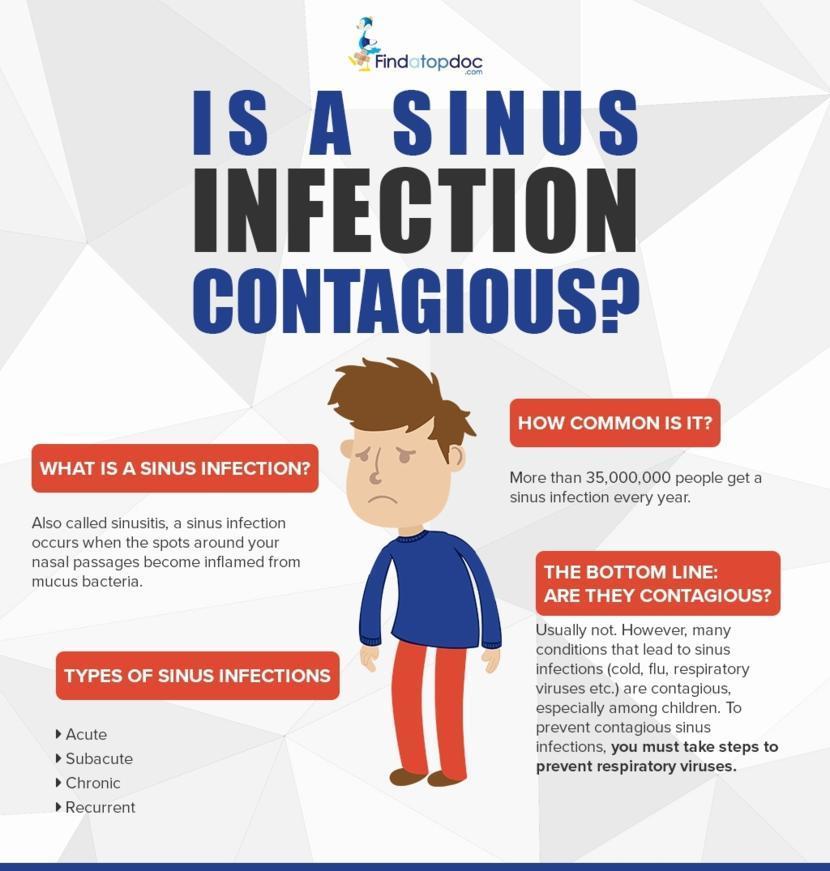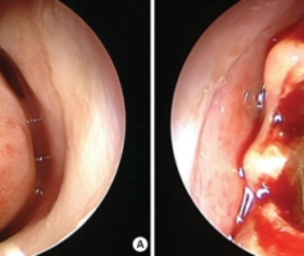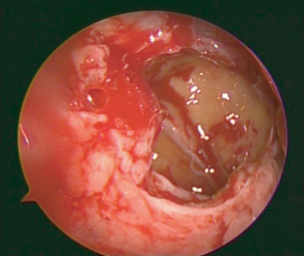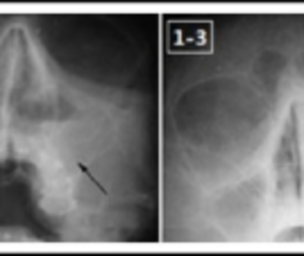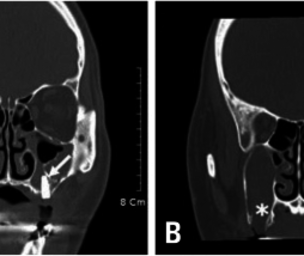Can You Recognize a Sinusitis Infection?

You may have sinusitis without knowing it.
Sinusitis is the inflammation of the sinuses, the air-filled spaces or cavities on the face near the nose. These spaces are connected to the inside passages of the nose.
Sinusitis is a very common complaint, affecting one out of every seven adults in the United States. It is often as common as a cold in some people. Weather patterns may have a role in the prevalence of sinusitis because it tends to occur in early fall and spring. Sinusitis is more common in adults than in children, whose sinuses are not yet fully developed.
The inside of the sinuses is normally sterile, having no bacteria or viruses. The sinuses have several important functions that most of us overlook. The spaces in sinuses lighten our otherwise bony face, help resonate our speech, serve as a sort of “crumple zone” to protect vital structures in case of injury, and humidify and heat the air we breathe.
The sinuses are lined with cells that continually produce mucus to moisturize and lubricate the cavity to avoid friction when you move your face or swallow.
Sinusitis occurs when the sinuses become inflamed due to bacteria or viruses. The presence of bacteria or viruses triggers inflammation and infection. If this happens, the lining of the sinuses become swollen, causing very uncomfortable symptoms.
Sinusitis can occur due to several reasons, such as:
- Infections
- Allergies
- Breathing in substances in the air
- Physical trauma
Sinus infection symptoms, such as a headache, tenderness of the face, and nasal congestion, often prove uncomfortable and intolerable to many people. Sinusitis symptoms are described as “severe” when you find it hard to work, concentrate, or focus.
The majority of sinusitis cases are caused by viruses, although bacteria are often the culprits in hospitalized patients. Sinusitis can occur along with respiratory diseases, such as colds or flu.
Despite being very common, fortunately, sinusitis does not often lead to complications.
Although 40% of sinusitis cases caused by bacteria heal on their own, most cases require medical intervention.
The disease course makes it more bothersome than threatening to health.
Medicines and nasal decongestants work well. Home remedies are also effective in improving comfort and relieving sinusitis symptoms. Treatment is not a guarantee that you will be free from sinusitis for a long time, as it has many causes.
How Does Sinusitis Develop?
The sinuses are air-filled spaces with passageways that connect to the inside of the nose. The inside of the sinuses is lined with mucus-producing cells that provide lubrication and prevent the passageways from drying out.
The inside of the nose has plenty of microorganisms because it is connected to the outside environment, but the sinuses are normally sterile (no bacteria, viruses, or fungi).
Sinusitis often occurs when bacteria or viruses make their way into the sinuses. The sinuses react by initiating inflammation and production of more mucus. Swelling blocks the passageway between the sinus and the nasal passages, so mucus builds up, resulting in congestion and headache.
The body initiates infection responses due to the presence of microorganisms and buildup of mucus, causing fever and fatigue.
Since the sinuses are located on the sides of the nose and up to the forehead, sinusitis often causes tenderness in these areas.
Allergies can also trigger sinusitis by blocking the passageways leading to the sinuses, which prevents mucus drainage. The backed-up mucus irritates the sinuses and causes inflammation.
Some cases of sinusitis are caused by foreign objects, polyps, tumors, or swelling from rhinitis blocking the flow of mucus.
Low humidity can also cause sinusitis by making mucus thicker and more difficult to remove.
How Long Does Sinusitis Last?
The length of a bout of sinusitis depends on the cause of infection and effectiveness of treatment.
Sinusitis symptoms subside soon after the cause of infection or blockage is treated. Sinusitis that less than 12 weeks is referred to as acute sinusitis and is more common.
Cases lasting longer than 12 weeks despite treatment are termed chronic sinusitis, which requires further intervention.
Are Sinus Infections Contagious?
Yes and no. Sinusitis itself is not contagious, but the viruses that lead to it often are and can be transferred from person to person through water droplets. If someone has a cold, you could very well catch it and thus possibly result in a sinus infection.
However, many of the causative bacteria or viruses are already present in most individuals. Avoid saliva contact if you have sinusitis.
Recognizing the Signs of Sinus Infections
Symptoms of sinusitis can be mistaken for other conditions, such as rhinitis and common colds. Rhinitis and colds alone do not affect the sinuses.
Some tell-tale signs of sinus infections are:
- Tenderness or pain in the face: This is a common sign of sinusitis that is usually not present in other conditions. The sinuses sit on the sides of the nose and reach up to the forehead. Pain, tenderness, or heaviness around this area can indicate sinusitis. The discomfort intensifies when bending down or straining. The nose, cheeks, or eyelids may also become flushed.
- Constant headache: Another common symptom of sinusitis is a long-running or continuous headache. The headache is often felt around the front of the head, with no specific point of origin. It is often caused by a buildup of mucus in the irritated sinuses and often goes away once the mucus clears up. Lying down on a bed often works to clear mucus and relieve headache.
- Persistent nasal congestion: Although this may occur in colds and allergies, sinusitis also causes pronounced nasal congestion. Often, the nose becomes blocked, making nasal breathing difficult. Expelling discharge from the nose may relieve heaviness temporarily. The discharge from the nose can be thick or thin, clear or greenish yellow.
- Noticeable post-nasal discharge: Sinusitis often causes mucus to drip down the throat, which can sometimes lead to a sore throat. You may be able to expel the discharge from the mouth.
- Moderate to high fever: Sinusitis often causes fever as consequence of infection in the sinuses. Sometimes, other conditions like rhinitis and sore throat add up and cause fever. Other significant symptoms of rhinitis include changes or loss of smell and taste, pain in the jaw, cough, fatigue, fullness or pressure in the ear, and persistent cough.
Diagnosing Sinusitis
Most people see their doctors once sinusitis symptoms become too miserable. Doctors can easily diagnose sinusitis by examining symptoms and doing a physical examination.
If necessary, the doctor may order additional tests to determine the cause of sinusitis. They may examine the inside of your nose for foreign bodies, swelling, blockage, or bleeding using a nasoscope.
Blood tests may be ordered to check for problems in the immune system or the presence of other conditions. If complications are suspected or if the patient presents chronic sinusitis, the doctor may order facial x-rays or CT (computed tomography) scans. Ultrasound imaging and CT scans are very useful in detecting sinusitis complications near or around the eye area.
If allergies are suspected, your doctor may perform allergy tests to determine the allergen responsible. The doctor may also retrieve a sample of nasal secretions and have it cultured in the lab to detect the culprit. This may be done to patients in intensive care or who have depressed immune systems.
If the patient is a woman of reproductive age, the doctor may order a pregnancy test. A sinus infection while pregnant can be caused by changes in hormones, which makes the nasal passages prone to congestion.
Sinusitis Treatment
Getting enough rest and preventing the worsening of symptoms could be the best course of action for battling sinusitis.
Most cases of sinusitis go away on their own within a week. Sinusitis caused by viruses is often self-limiting, and symptoms can go away with rest and home remedies.
The majority of sinusitis cases are treated at home. However, sinusitis in children, pregnant women, the elderly, and those who have colds or flu require urgent treatment in the doctor’s clinic. Chronic sinusitis also requires treatment supervised by a doctor.
The goal of sinus infection treatment is to reduce inflammation of the sinuses, promote drainage, eliminate the cause of the inflammation, and reduce flare-ups.
For acute sinusitis, the doctor may prescribe saline nasal sprays to rinse the inside of your nose to clear blockages in the sinuses. You may have to spray it several times a day. Decongestants are also prescribed to relieve congestion. Decongestants are available in nasal sprays, tablets, or liquids taken by mouth.
Don’t use decongestants for more than three days, as doing so often results in recurrent congestion. You can also take prescribed pain relievers such as acetaminophen, aspirin, or ibuprofen, if you have a fever, too. If inflammation or swelling persistents, your doctor may prescribe corticosteroid sprays that treat it directly; make sure you use those medicines as prescribed.
In the case of sinusitis with a bacterial infection, your doctor may prescribe antibiotics. Although waiting is usually done first, antibiotics are often needed for worsening or persistent cases.
If allergies are the culprit, the doctor may give allergy shots (immunotherapy) that may help reduce your body’s reaction to the allergens.
More aggressive treatments are needed for sinusitis that occurs in hospitalized patients or those with weak immune systems. In this instance, you may be given vasoconstrictor medicines, which work by shrinking the insides of the nose to promote drainage.
If treatments do not work, a minor surgery may be performed to drain mucus inside the sinuses or enlarge their opening.
Surgery can also be recommended for cases of sinusitis caused by foreign objects, polyps, or tumors inside the nose.
Home Remedies for Sinusitis
Fortunately, most cases of sinusitis respond well to home remedies. Home remedies for sinus infection can be used along with prescribed treatments.
Bed rest is very helpful, as lying down promotes drainage of mucus in the sinuses. Rest also helps your body fight infection; sleeping elevated at the head of bed works best.
Make sure to drink plenty of fluids to dilute mucus for easier drainage. Inhaling steam and irrigating the nose with saline are also helpful.
Facial pain is often caused by a buildup of mucus, so performing the aforementioned home remedies often works to relieve it. Also, warm compresses are helpful in dealing with facial pain.
Complications
Complications of sinusitis occur when the infection spreads beyond the sinuses.
These complications are more likely to happen in patients with compromised immune system or those who have other medical conditions, such as diabetes, HIV/AIDS, cystic fibrosis, or an infection in the lungs or other parts of the respiratory system.
The troubling problem with sinusitis is its location; it is near vital areas like the facial bones, airways, eyes, and brain. Chronic sinusitis may lead to infection of the muscles (myelitis) or the bone (osteomyelitis) on the face.
Chronic sinusitis often has a higher risk of complications. Cysts called mucoceles may form in the sinuses due to the buildup of mucus, and if not removed, they can erode nearby bone.
Rarely, an abscess known as a Pott puffy tumor may form in the sinus that causes the forehead to swell.
One of the most common sites of complication is the thin, delicate bone around the eye, called the orbit. The area may swell, form a collection of pus or abscess, or affect tissues near the eye.
Another serious complication of severe sinusitis is meningitis. It can occur when the infection makes its way into the skull through a vein or fistula (a new passageway), and it often occurs when the abscess is left untreated.
In some cases, physical trauma allows the infection to make its way into the brain.
Preventing Sinusitis
You can reduce the likelihood of having sinusitis by managing your allergies appropriately, avoiding individuals with colds or the flu, and staying away from cigarette smoke.
Using a humidifier also prevents irritation of the nasal passages that can lead to sinusitis.

